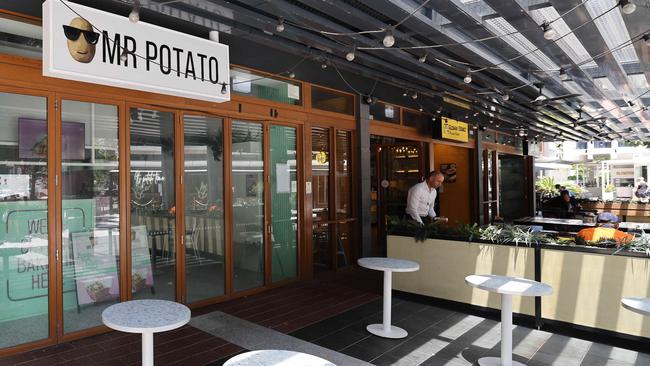Former franchisees of Mr Potato stores sell homes, contemplate legal action after fast food failures
Former franchisees of a national fast food chain have had to sell their homes and consider legal action after their stores failed to turn a profit. Read their stories
Gold Coast
Don't miss out on the headlines from Gold Coast. Followed categories will be added to My News.
Former franchisees of a national fast food chain have had to sell their homes and consider legal action after their stores failed to turn a profit.
The Mr Potato chain has lost more than half its network in the past two years, with its last Queensland stores, at Mermaid Waters and Broadbeach, closing this week.
As the number of franchises boiled down from 13 to six, its high-profile founders have been seeking investment in their next project – a luxury eco resort on a remote island in Tonga.
But while former franchisees said they believed they were set up to fail, Mr Potato founders Jessica Davis and Tyson Finau say they “go above and beyond to assist when needed”.

Franchisees fried
While the Gold Coast stores were firing staff and closing their doors, Andrew Lim was moving out of his home after being forced to sell it.
His Mr Potato franchise in the Perth suburb of Joondalup closed in November, after he’d ploughed in more than $500,000.
“I had a lot of fights with my partner, because it was my idea to proceed with the business – it’s been very stressful,” he said.
A NSW former franchisee, whose name has been withheld from publication, said they too had to sell their home after taking a huge loss on Mr Potato.
“And now I have to sell my other business – I’ve lost everything from this.”
Founder Mr Finau said he and Ms Davis “care deeply about our franchisees and want them to succeed”.
“That’s why we invest so much effort into ensuring our franchisees receive the training, systems, and support they need to succeed,” he said in a statement.
Small potatoes
Mr Lim said he was given encouraging financial projections before signing up for the store, but the reality didn’t come close.
“My actual revenue for the year was only $450,000 – less than half (the projection).”
As the losses mounted, Mr Lim stopped paying Mr Potato’s royalties, opting instead to ensure his staff were paid. His agreement was terminated in November 2024.
The NSW franchisee said they were also given turnover projections that were off the mark.
“I ran a loss of $130,000 in seven months,” the franchisee said.
“Along the way I was expressing my concerns to the franchisors and they would just say, ‘What aren’t you doing?’.
“I worked in that store six days a week, I drew no income from it.”
Mr Finau said Mr Potato was “a proven business model with extensive support”.
“However, success is not automatic - it requires commitment, adherence to systems, and proactive engagement from the franchisee,” he said

Slow-cooked launches
Both Mr Lim and the NSW franchisee had issues with the design and build of their stores, which were unable to open on time. Both paid three months’ dead rent.
Some franchisees also said they paid a $10,000 “marketing fee” when their stores opened, but say they were not provided invoices to demonstrate how the funds were spent.
Mr Finau said Mr Potato provided “comprehensive store setup support” but some factors were beyond its control. He declined to say how the marketing funds were spent.
“All financial discussions, including marketing spend allocation, are commercially confidential and form part of individual franchise agreements.”
Supplies smashed
Another former franchisee, whose name has also been withheld from publication, said suppliers had refused to deal with their store because it was a Mr Potato.
“No suppliers say anything good,” they said.
“I worked full-time in the business, did catering for weddings and events and I still couldn’t get it to work.”
The NSW franchisee said they “would call suppliers to get better deals, but no-one would work with us because we were branded Mr Potato.”
Ms Davis said head office was not responsible for managing suppliers.
“Our supply chain operates through a nominated list of preferred suppliers, which is standard industry practice, and it remains the franchisee’s responsibility to manage supplier payments and logistics effectively,” she said in a statement.

Legal action simmers
Current and former franchisees have connected online as cracks have emerged in the chain, with some mulling joint legal action against the franchisor.
“The good thing is now we have each other and we can consult – we are hoping to prevent other people being victims,” Mr Lim said.
The founders are planning a six-month tour of Australia in a Mr Potato food truck, with more than 70 locations listed for stop-off along the way.
Former store holders worry it is a recruitment drive for more franchisees who may struggle to succeed with the brand.
Mr Finau said he encouraged franchisees to “conduct thorough due diligence before making financial commitments”.
Ms Davis, who made a quest to be Miss Universe last year, said Mr Potato adhered to the Australian Franchise Code.
“Franchisees have seven-day access to head office support, and we consistently go above and beyond to assist when needed,” she said.
“While Mr Potato cannot disclose individual franchisee financials, we can report significant sales growth and record-breaking performances in well-managed stores over the past 12 months.”
More Coverage
Originally published as Former franchisees of Mr Potato stores sell homes, contemplate legal action after fast food failures




